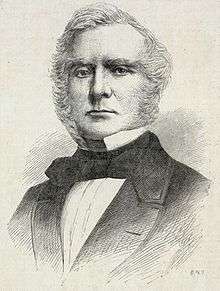Moses H. Grinnell
Moses Hicks Grinnell (March 3, 1803 – November 24, 1877) was a United States Congressman representing New York, and a Commissioner of New York City's Central Park.
Moses H. Grinnell | |
|---|---|
 Grinnell as Collector of the Port of New York in 1869. | |
| Member of the U.S. House of Representatives from New York's 3rd district | |
| In office March 4, 1839 – March 3, 1841 | |
| Preceded by | Churchill C. Cambreleng |
| Succeeded by | Charles G. Ferris |
| Personal details | |
| Born | March 3, 1803 New Bedford, Massachusetts |
| Died | November 24, 1877 (aged 74) New York City |
| Resting place | Sleepy Hollow Cemetery |
| Political party | Whig |
| Relations | Joseph Grinnell (brother) |
Early life
Grinnell was born in New Bedford, Massachusetts. After attending public schools, he took his first paying job at the age of 15, working in a "counting room" in New York City.
Career
He became a successful merchant and shipper and was subsequently appointed as president of the New York Chamber of Commerce. However, unlike his brother Joseph Grinnell, who represented Massachusetts for four terms as a Whig, Moses did not stick to a single political party. He was first a Democrat, then became a Whig in the 1830s, was an "out-and-out Native American party man" the 1840s, and in the 1850s joined the newly founded Republican Party, for which he served as a presidential elector in 1856.[1][2]
The pilot boat Moses H. Grinnell was built in 1850 for the Jersey pilots and designed by George Steers. It was owned by George W. Blunt. It was run down by the steamer Union on the Outer Middle Ground. The Grinnell was the first pilot boat to show the fully developed long entry that was to become the New York schooner's trade mark.[3]
In February 1860, president-elect Abraham Lincoln, on his way to Washington, D.C., visited the Manhattan home of Grinnell's daughter, whose father had invited many of New York City's most prominent businessmen to meet the first Republican president. Grinnell subsequently wrote Lincoln with introductions for others, becoming something of a conduit of political power, if not a wielder of such himself.[1]
Grinnell was Collector of the Port of New York from March 1869 to July 1870, and the Port's Naval Officer of Customs from July 1870 to April 1871. Perhaps best remembered for his work as Central Park Commissioner during the early years of the urban park's design and construction.
Personal life
Moses Grinnell died in Manhattan on November 24, 1877. His funeral service was at the Unitarian Church of All Souls and he was buried in Sleepy Hollow Cemetery, Sleepy Hollow, New York.[1][4]
References
- "Moses Hicks Grinnell". Biographical Directory of the United States Congress. Retrieved 2011-05-01.
... a Representative from New York; born in New Bedford, Mass., March 3, 1803; pursued an academic course; entered a countingroom in New York City in 1818; subsequently engaged in mercantile pursuits; elected as a Whig to the Twenty-sixth Congress (March 4, 1839-March 3, 1841); unsuccessful candidate for reelection in 1840 to the Twenty-seventh Congress; presidential elector on the Republican ticket in 1856; president of the chamber of commerce and of the Merchants Clerks’ Savings Bank; commissioner of charities and corrections; Central Park commissioner; one of the Union defense committee; collector of the port of New York from March 1869 to July 1870; appointed naval officer of customs and served from July 1870 to April 1871; died in New York City November 24, 1877; interment in Sleepy Hollow Burying Ground, Tarrytown, N.Y.
- Hone, Philip (1889). Tuckerman, Bayard (ed.). The Diary of Philip Hone: 1828-1851. II. New York: Dodd, Mead and Company. p. 212.
- Cunliffe, Tom (2001). Pilots, The World Of Pilotage Under Sail and Oar. Brooklin, Maine: WoodenBoat. p. 73.
- "The Late Moses H. Grinnell". New York Times. November 26, 1877. Retrieved 2011-05-01.
The arrangements for the funeral of the late Moses H. Grinnell were made yesterday. The funeral services will take place at 10 o'clock to-morrow morning in the Church of All Souls, at the corner of Fourth-avenue and Twentieth-street, the Pastor, Rev. Dr. Henry W. Bellows, officiating. Mr. Grinnell and Dr. Bellows were friends for many years, and it was by the aid of Mr. Grinnell's liberality that
Further reading
- "Moses H. Grinnell (1803-1877)". Abraham Lincoln and New York. The Lincoln Institute. Archived from the original on 2011-06-06. Retrieved 2020-03-11.
- Sheldon, George W. (February 1892). "Old Shipping Merchants of New York". Harper's Magazine. 84: 457–471, 463, 464.
- Wilson, George (1890). Portrait gallery of the Chamber of Commerce of the state of New-York. New York: Press of the Chamber of Commerce. pp. 44–47. OCLC 2747994.
| U.S. House of Representatives | ||
|---|---|---|
| Preceded by Churchill C. Cambreleng |
Member of the U.S. House of Representatives from New York's 3rd congressional district 1839–1841 |
Succeeded by Charles G. Ferris |
| Government offices | ||
| Preceded by Henry A. Smythe |
Collector of the Port of New York 1869–1870 |
Succeeded by Thomas Murphy |